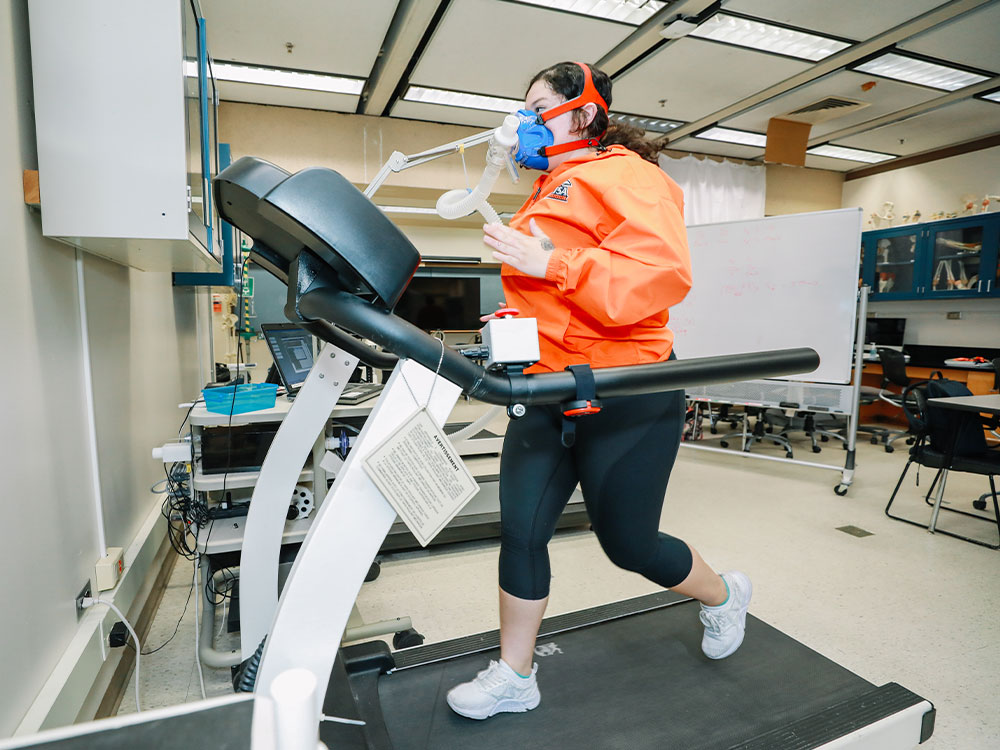
Why Pursue a Kinesiology Master's Degree
Students can select from one of four specializations to tailor their area of study: Exercise Physiology, Motor Behavior, Sport and Exercise Psychology, and Strength and Human Performance. Within each specialization, students can choose to complete either a thesis option (30 total semester credit hours) or non-thesis option (36 total semester credit hours).
The MS in Kinesiology degree represents the only R1 graduate program in Kinesiology in south Texas. Moreover, as a Hispanic Serving Institute holding the Seal of Excelencia, UT San Antonio is uniquely positioned to serve and meet the educational needs of its students and surrounding community. These distinguishing features make this institution a premier destination for students in the region to obtain an advanced degree in the field of Kinesiology.
See What Our Students Say
When you choose UT San Antonio, you join a community of talented scholars and professionals being taught by award-winning faculty. Learn more from alumnus Gabriel Impelluso as he discusses his graduate school experience from master’s to PhD.

Faculty Research
Dive into a vigorous research-focused curriculum aimed at providing students the experiential education that will take them to the next level in their career journey. All students take coursework in research methodology and statistical analysis. Research Laboratory includes:
- Applied Biomechanics Research Laboratory
- Cardiovascular Research Laboratory
- Developmental Motor Cognition Laboratory
- Exercise and Health Psychology Laboratory
- Human Performance Laboratory
- Molecular Exercise Physiology Laboratory
- Motor Learning/Control Study Laboratory
Master of Science in Kinesiology Concentrations
The Kinesiology master’s program offers 4 concentrations. For a complete list of courses, see courses and schedules below.
Classes meet once a week in the evenings, which makes it accessible for those with full time jobs.
The MS in Kinesiology is designed to provide a science-based education that prepares you for a wide range of careers in health, human performance and movement science. You’ll start with a solid academic foundation through research and statistics courses, building critical thinking skills needed to evaluate and apply emerging research. You’ll then customize your path through one of four concentrations.
All graduate classes are held in the evenings at the UT San Antonio Main Campus.
Admission & Application Requirements
Applications are submitted through the UT San Antonio Graduate Application. Please upload all required documents (listed below) on your UT San Antonio Graduate Application. It is the applicant’s responsibility to ensure completion and submission of the application, a nonrefundable application fee, and all required supporting documents are on file with UT San Antonio by the appropriate application deadline.
| Kinesiology (MS) | ||
|---|---|---|
| Required Degree | Bachelor's Degree from an accredited college or university in the United States or have proof of equivalent training at a foreign institution. | |
| Minimum GPA | 3.0 (on a 4.0 scale) Departments may consider GPA of last 60 semester credit hours | |
| Coursework | Completed adequate credit hours or foreign institution equivalent coursework as preparation for the program. | |
| Transcripts* | Required from all institutions attended; international transcripts must be recorded/translated to English | |
| Credential Evaluation | Required if you have earned university-level credit from foreign institutions. Submit an evaluation of your transcripts from FCSA or any NACES-approved credential evaluation agency. | |
| English Language Proficiency | 550 TOEFL Paper / 79 TOEFL Internet / 6.5 IELTS / Duolingo 100 | |
| Purpose Statement | Required | |
| Resume | Required | |
| Letters of Recommendation | 2 academic or professional reference(s) demonstrating your attributes for successful completion of this program (you will request these through the Graduate Admissions Application; let your recommenders know of your deadline to ensure submissions are on time). Professional references for this program are preferred. | |
| *Unofficial transcripts will be taken into consideration for admissions; however, if admitted into the program, you must submit official transcripts to the University. | ||
Application Deadlines
Applicants are encouraged to have their admission file completed as early as possible. All applications, required documents and letters of recommendation, if applicable, must be submitted by 5:00 PM U.S. Central Time on the day of the deadline. Deadlines are subject to change.
| Kinesiology (MS) | |||
|---|---|---|---|
| Timing on Admission Decision: Completed applications will be reviewed for admission on a rolling basis. Decisions generally will be made and sent to applicants within 4 to 6 weeks of receiving the application. | |||
| Application Deadlines for: | Priority | International | Domestic |
| Spring 2026 | November 1 | December 1 | |
| Summer 2026 | Not Available | Not Available | |
| Fall 2026 | June 1 | August 1 | |
| Spring 2027 | November 1 | December 1 | |
| Summer 2027 | Not Available | Not Available | |
Funding Opportunities
Learn moreCareer Options
UT San Antonio prepares you for future careers that are in demand. The possible careers below are based on data pulled by a third-party tool called Emsi, which pulls information from sources like the U.S. Bureau of Labor Statistics, U.S. Census Bureau, online job postings, other government databases and more to give you regional and national career outlook related to this academic program.

